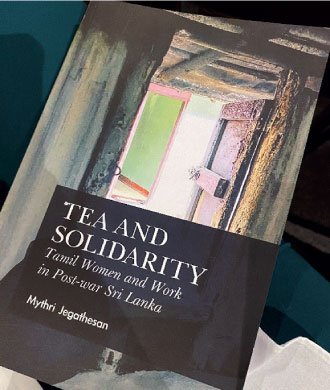Monday Feb 16, 2026
Monday Feb 16, 2026
Wednesday, 12 April 2023 01:38 - - {{hitsCtrl.values.hits}}
 On a muggy Friday afternoon, the auditorium of the National Library of Sri Lanka slowly filled with an eager audience from Colombo, the Hill Country and beyond. It was the launch of a book by Associate Professor of Anthropology, Dr. Mythri Jegathesan, of Santa Clara University.
On a muggy Friday afternoon, the auditorium of the National Library of Sri Lanka slowly filled with an eager audience from Colombo, the Hill Country and beyond. It was the launch of a book by Associate Professor of Anthropology, Dr. Mythri Jegathesan, of Santa Clara University.
Her book, a work on and of solidarity with the Hill Country Tamils of Sri Lanka, ‘Tea and Solidarity: Tamil Women and Work in Post-war Sri Lanka’ was originally published by the University of Washington Press in 2019 to widespread acclaim. It was awarded the 2020 Diane Forsyth Prize for the best book featuring feminist anthropology research and in 2021, it won the Michelle Z. Rosaldo Book Prize for its significant contribution to feminist anthropology.
This powerful study deals with themes of dignity, shame, and quotidian violence experience by women and men on and beyond plantations, and combines archival materials and historical knowledge with ethnographic research conducted over a period of almost a decade. However, for many, this book remained largely out of reach, within the preserves of academic scholarship in university libraries abroad. In that context, the partnership between Dr. Jegathesan and the Colombo-based Tambapanni Academic Publishers (TAP) is an important bridge that makes world-class scholarship accessible to those of us in Sri Lanka.
 On 17 March 2023, the Sri Lanka edition of ‘Tea and Solidarity’ was launched and made available for purchase at Rs. 2,000 (with a special discounted price of Rs. 1,800 on the day). The affordability of books written on Sri Lanka or that have relevance to Sri Lanka is one of the primary preconditions upon which TAP operates. Established in 2020 by Professors Nira Wickramasinghe and Sasanka Perera, and Karnika Jayatilake and Coralie Pietersz as an independent publisher of innovative non-fiction, TAP specialises in the humanities and social sciences.
On 17 March 2023, the Sri Lanka edition of ‘Tea and Solidarity’ was launched and made available for purchase at Rs. 2,000 (with a special discounted price of Rs. 1,800 on the day). The affordability of books written on Sri Lanka or that have relevance to Sri Lanka is one of the primary preconditions upon which TAP operates. Established in 2020 by Professors Nira Wickramasinghe and Sasanka Perera, and Karnika Jayatilake and Coralie Pietersz as an independent publisher of innovative non-fiction, TAP specialises in the humanities and social sciences.
The launch event itself and book were thoughtfully introduced by Balasingham Skanthakumar of the Social Scientists’ Association, Colombo. Afterwards, Dr. Jegathesan talked about how and why she began and conducted her research – first as a doctoral project and, later, as a dedicated book project written for a broader audience. What is ordinarily confined to an introduction or first chapter in a book was discussed with the audience, and it was humbling to hear from the author herself about the challenges – methodological, ethical, and intellectual – she faced. As Dr. Jegathesan recounted her personal experiences of field research, what became evident was the genuine care she had for her interlocutors that went above and beyond the expectations of academic research.
There were a number of younger or less-established scholars and development practitioners in the room – myself included. And in this public space, at an event open to everyone, TAP brought us into direct contact with an academic based at an American university many miles away. Of course, this is not unprecedented by any means in Sri Lanka, yet it remains all too infrequent. The audience engagement with Dr. Jegathesan during the Q&A, and afterwards in a more informal setting, was stimulating and could not have been replicated through online Zoom discussions.
In that context, TAP’s facilitation of local access to internationally published books (usually dollar-denominated and potentially unaffordable to those without a research allowance) and invitation to speakers to interact with Sri Lankan audiences are invaluable. I left the event with my own copy of ‘Tea and Solidarity’ feeling genuinely inspired by Dr. Jegathesan’s research, dedication, and sincerity.
Dr. Jegathesan’s book is among several other leading English-language academic publications re-published by TAP, including ‘Banishment and Belonging: Exile and Diaspora in Sarandib, Lanka and Ceylon’ by Professor Ronit Ricci, and ‘Slave in a Palanquin: Colonial Servitude and Resistance in Sri Lanka’ by Professor Nira Wickramasinghe. Dr. Bandura Dileepa Witharana’s ‘Negotiating Power and Constructing the Nation: Engineering in Sri Lanka’ is TAP’s first original publication meant for worldwide distribution. Meanwhile, Sinhala-language publications include සිලෝනයෙන් ශ්රී ලංකාවට: යටත්විජිතත්වය, ජාතිය, සහ අවකාශීය දේශපාලනය by Nihal Perera, which is a translation of his 1999 original, Decolonizing Ceylon and තුටින් පිරී ගිය එක් මොහොතක a collection of poems by Rumi from multiple sources translated, edited and compiled by Professor Sasanka Perera and Indu Gamage.
The increased accessibility (in terms of price and language) of important scholarship and literature produced by local academics (or foreign academics working on local issues) is significant for several reasons. As new knowledge continues to be produced at home and abroad, and while previously published scholarship is revised into new Sri Lankan or regional editions, authors can increase the reach and, hopefully, the impact of their work with local audiences.
Similarly, our growing local readership who do not have free online access to scholarly texts will benefit from the publications of local presses such as TAP styled upon better known university presses in terms of editorial policy and selection criteria. Finally, through ‘TAP Essentials’, the press offers authors the opportunity to publish ‘short, incisive and original research on issues that are important for society’. Thus, it represents an additional publishing and dissemination platform for important and time-sensitive research that has the potential to shape discourse and ideas in society.